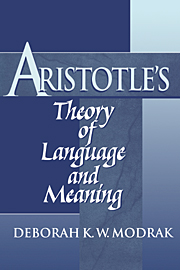7 - Phantasia and Representation
Published online by Cambridge University Press: 16 November 2009
Summary
In De Interpretatione 1, no sooner has Aristotle asserted that the mental states that words stand for are likenesses of the pragmata of the world, than he dismisses this topic with the words:
This matter has, however, been discussed in my treatise about the soul, for it belongs to an investigation distinct from that which lies before us. (16a8–9; trans. follows Edghill)
The place in the De Anima that Aristotle has in mind in the De Interpretatione is not easily discovered. Nor is it entirely clear which features of the theory of meaning will or should be explained there. Is it merely the nature of the psychic pathemata (internal states) or the likeness obtaining between the pathemata and their external correlates (pragmata)?
Speech is not mentioned in its own right in the De Anima but only in connection with hearing.
Consequently speech [φωvή] is the impact of the inbreathed air against that which is called the windpipe by the soul in these parts … what produces the impact must have soul in it and must be accompanied by an act of imagination [φαvτασίζ] for speech is a sound with a meaning [σημαvτικόζ] and not merely the inbreathed air as a cough is. (420b27–33)
Here the intent is to differentiate between speech and other types of noises produced by the respiratory system. What the passage adds to the De Interpretatione's description is the explicit mention of imagination (τασία).
- Type
- Chapter
- Information
- Aristotle's Theory of Language and Meaning , pp. 219 - 243Publisher: Cambridge University PressPrint publication year: 2000



